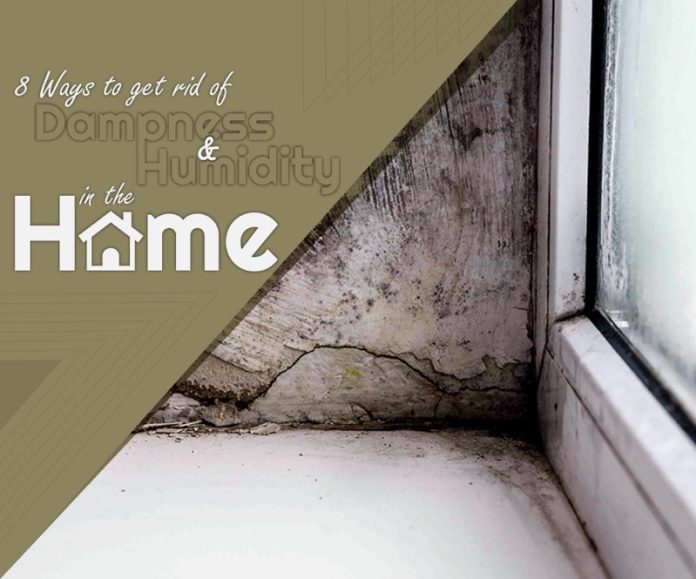Myriad factors can lead to a rise in humidity levels in a household. For example, use of certain construction materials, using a vapor retarder, underlying plumbing issues, how airtight the house is, insulation, quality of ventilation, etc. Of course the area where you live, its climatic conditions, and temperature also directly affect the overall humidity levels.
Your basement is a valuable part of your home. It can serve as a storage area, an entertainment space, or even your kids’ playtime paradise.However, there are a few dangers, such as mold and pests, that make your basement uninhabitable. These dangers affect your home’s structure, to be sure, but they can also put your family’s health at risk. Read more about – 4 Wet Basement Dangers You Should Take Care Of ASAP
In hotter areas such as the South, humidity levels are naturally higher due to higher air conditioning in usage all the time. Sometimes when an AC’s capacity is too much for a room, it can cook the air too quickly. The result is short and ineffective cooling cycles. This can let the humidity take hold of the environment.
[To know more, visit https://advanceddamp.co.uk/ruislip/]
How to Decrease Humidity and Dampness in Your House
Utilize Exhaust Fans
There’s a reason why there are exhaust fans and chimneys in bathrooms and kitchens. They help expel the excess humidity and obnoxious odors from out of the house. Fun fact – untreated humidity levels above 55% lasting for 1-2 days can cause mold and mildew to grow.
This is a huge reason why you must install exhaust fans in all the right places. Any time you have to take a shower or do heavy cooking, be sure to turn on the fans to let the excess moisture out.
Take Colder/Shorter Showers
Hot water baths are relaxing and great for your skin. However, they do produce a ton of steam. The longer you stay in the shower, the more steam it creates. Also, since bathrooms are smaller in size and doors are always closed, it’s very easy for moisture to get trapped released by steam.
To avoid that, turn on the ventilation and keep the window slightly open. Another thing you can do is take shorter showers and run the water a bit colder. These small changes can go a long way in maintaining the right moisture levels.
Grow Plants that Absorb Humidity
Many plants can absorb moisture from the air. Boston Ferns, for example, is a good plant to have in your home. Having house plants is not only good for reducing humidity, but they are also good for the environment. They release more oxygen, remove carbon dioxide, and overall make the room more breathable.
Take Preventive Measures
The ideal crawl space humidity level for your home is 50 to 55%. It may change slightly depending on where you live. This level allows your air to be healthy and decreases the side effects of a high humidity level. Mold needs at least 70% relative humidity level to grow and thrive. Crawl space encapsulation is when a vapor barrier is placed inside of your crawl space. A vapor barrier is a thin layer of impermeable polyethylene sheeting that prevents moisture diffusion through the basement wall. Crawl space encapsulation is the ultimate solution to lower crawl space humidity.
Many homes have crawl spaces with dirt flooring. If that’s the case, cover the flooring with a polyethylene cover. Keep the soil dry and make sure there’s no standing water. To help dry the area, you could use fans.
Also, make sure all duct vents lead directly outside. Not only is it bad for humidity levels, but it could also lead to potentially dangerous situations causing accidental fires.
Find Any Leaking Pipes
Faulty plumbing is the #1 reason behind higher moisture levels. It’s good to look into any leaky pipes or faucets.
Make sure to wrap any exposed pipes with insulations and fix any leaky faucets. This will avoid condensation from occurring. Common signs of leaky pipes are – wet spots, irregular water bills, and stained drywall.
Replace Your Carpet
You must clean and change the carpeting in your home every few years. You should get them cleaned at least twice a year. It’s not uncommon for carpets to retain a ton of moisture. Plus, since there may be dust mites living in carpets, they also love the water.
If you sense that the carpeting inside your house is to blame for the humidity problem, it might be time to replace it.
Get a Dehumidifier
The good thing about dehumidifiers is that they come in all price ranges and sizes. Some of the portable ones are super inexpensive. You can also move them from one room to another. Dehumidifiers are a great way to control humidity levels.
The best part is, they can work without any need for additional cooling like an HVAC unit does. So, if you don’t want to have to endure the cold to control humidity, investing in a dehumidifier is a great option.
Install an HVAC Unit
An HVAC unit is another excellent measure to avoid moisture build-up while also keeping the house cool. Most air conditioning units not only cool the air but also absorb warmer air thus reducing humidity levels.
It’s good to turn the unit on early in the day so that humidity doesn’t get a chance to build up.
Dry Your Laundry Outside
Not all clothes are dryer-safe. So, in winters, many people use indoor drying racks. However, during summertime, damp clothing can add to humidity build-up. It’s better to have a clothing line outside. Alternatively, use an outdoor drying rack to dry your laundry. But, be sure to check the neighborhood laws as some places may have certain restrictions.
In Conclusion
Failure to take early-on action against rising levels of moisture and humidity could lead to structural damage, damping, and even health issues. In the long run, it could fetch costly repairs and fixes.

